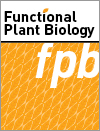We evaluated different water regimes on young cuttings of olive (Olea europaea) cvs Arbequina and Barnea inoculated with or without arbuscular mycorrhizal fungi (AMF) in a central-western olive grove in Argentina. We measured AMF morphospecies richness and abundance in the soil, plant vegetative growth, plant adaptation to drought stress, and crop water status. We found that certain morphological, physiological and biochemicalindicators may be useful to identify new strategies to mitigate water stress and improve water use efficiency during transplantation.

Functional Plant Biology
Volume 51 Number 7 2024
Heliotropium thermophilum did not exhibit significant stress parameters under high soil temperature conditions, and it was a highly tolerant plant to high temperature. In the measurements taken at pre-flowering and flowering, plants in the pre-flowering stage were slightly more tolerant to high temperatures. The protection of PSII function in plants at higher temperatures could be linked to an increase in antioxidant activities.
Increased potassium (K) concentration in grape (Vitis vinifera) berries is associated with loss of acidity and high sugar content in juice. This study demonstrated that the K supply to Shiraz and berry ripening phase could impact the berry attributes and chemical composition at harvest, associated with the linkages between water, sugar, K and ATP. From this study, we suggest that grape berry maturation and composition management may be beneficial.
FP23141 Abstract | FP23141 Full Text | FP23141PDF (3.2 MB) | FP23141Supplementary Material (3.2 MB) Open Access Article
Soil salinity is a worldwide environmental constraint that affects crops growth and productivity. Silicon supply has been observed to ameliorate crops growth under various stresses. In this study, silicon supply was found to significantly enhance the decline the growth of sorghum-sudangrass (Sorghum bicolor × Sorghum sudanense) under salinity stress, increasing productivity and enhancing plants vigour throughout many aspects. Hence, silicon seems to be a promising approach to strengthen agriculture yield.
This study reveals a new acclimation mechanism of microalgae in low atmospheric pressure. Experimental results and molecular dynamic simulations indicate that low atmospheric pressure reduces the density and enhances the fluidity of photosynthetic thylakoid membranes, leading to enhanced photochemical quenching. Particularly, extremely low pressure (<10 mbar) in a 100% CO2 atmosphere (Mars-like atmosphere) yields a photosynthetic efficiency comparable to that of Earth, shedding light on new astrobiological perspectives.
The improvement of tomato (Solanum lycopersicum) for various biotic and abiotic traits that affect the roots functions is vital, and root-specific promoters are tools to improve the gene expression of transgenes. SlREO is one tissue-specific promoters in tomato. This study cloned and characterised SlREO in Indian tomato cultivar, and evaluated its activity in various crops. Transgenic studies suggest that SlREO is a crop-dependent tissue-specific promoter that cannot be used to improve the expression of genes in other crops.
This article belongs to the Collection Functional Genomics for Developing Climate Resilient Crops.
We studied the genetic blueprint of mango (Mangifera indica) trees, and identified a crucial gene family for plant health and stress responses. We identified and examined 65 genes responsible for signalling pathways within mango plants. By unravelling these genetic intricacies, we pave the way for potential advancements in mango cultivation, and offer opportunities for developing better resilience against environmental challenges and the development of superior mango varieties.
This article belongs to the Collection Functional Genomics for Developing Climate Resilient Crops.





